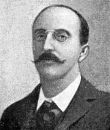
 Bissolati, Leonida. (1894-199). Born at Cremona, 1857; died Rome, 1920
Bissolati, Leonida. (1894-199). Born at Cremona, 1857; died Rome, 1920
A man of the political Left, Bissolati shared patriotic, even imperialistic, goals with the Center and the Right. He rose from a communal councilman and contributor to Turati’s journal Il Preludio to become a founder of the Socialist Party (PSI), a member of parliament, and director of the PSI’s national newspaper, Avanti! before the turn of the century. Bissolati became a leader of the reformist wing of the PSI and of the democratic united front with the Radicals and the Republicans against rightist policies of repression in the early years of the 20th century, during which he was imprisoned for two months.
Following the liberalization of politics after the assassination of King Umberto I, Bissolati and fellow reformist Socialists supported Liberal Party coalitions of Giovanni Giolitti. This support extended to the Giolittians’ Tripolitan War against the Ottoman Empire in 1911, in exchange for promised liberal reforms, despite the PSI’s anti-war stance. The subsequent visit of Bissolati and other reformists to congratulate King Vittorio Emanuele III upon his escape from assassination resulted in their expulsion from the PSI at the party’s 1912 congress, the motion for which was presented by revolutionary Socialist Benito Mussolini, who soon became director of Avanti!
When war erupted in 1914, Bissolati – now a parliamentary deputy of the new Refomist Socialist Party – emerged quickly as a democratic interventionist calling for Italy’s support of the Triple Entente. (Mussolini would later join the interventionist camp, too). In his late fifties, Bissolati volunteered and served as a sergeant in an Alpine regiment, was wounded and decorated for valor. He then joined the government of Paolo Boselli (1916-17) as minister without portfolio and liaison to the Army. Bissolati also served in the V. E. Orlando cabinet (1917-19), but – a supporter of the vision of Woodrow Wilson -- he broke with that regime shortly after the war’s end over the matter of the conditions for peace. A supporter of the League of Nations, Bissolati rejected some of the non-Italian territories promised Italy under the Pact of London of 1915 and sought instead the Italian-populated city of Fiume on the Adriatic. Painted as a renunciator, Bissolati’s popularity declined, and he played only a marginal role in the country’s political affairs during the last year of his life. He was, however, widely mourned upon his death in 1920, and the claim on Fiume became a major rallying point for Italian nationalists such as Gabriele D’Annunzio and Mussolini as they strove for power in postwar Italy.

Leonida Bissolati, Diario di Guerra. Turin: Einaudi, 1935.
Ivone Bonomi, Leonida Bissolati e il movimento socialista in Italia. Milan: Cogliatti, 1929.
Raffaele Colapietra, Leonida Bissolati. Milan: Fletrinelli, 1958.
Feruccio Rubbiani, Il pensiero politico di Leonida Bissolati. Florence: Battistelli, 1921.
“Leonida Bissolati,” Scheda biografiche personaggi.
Return to Names List
